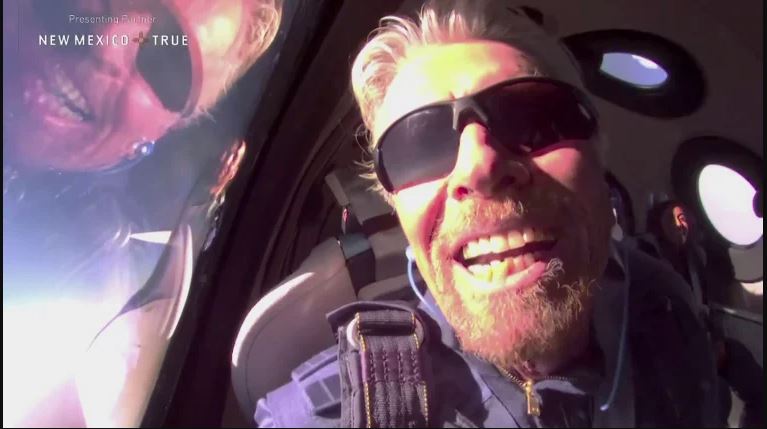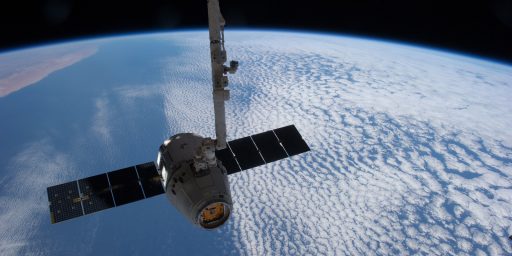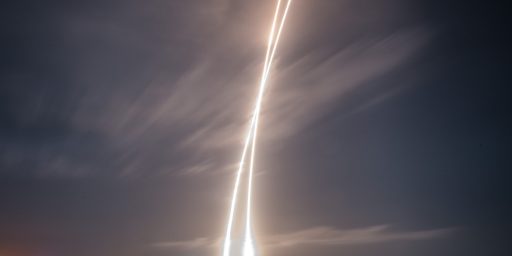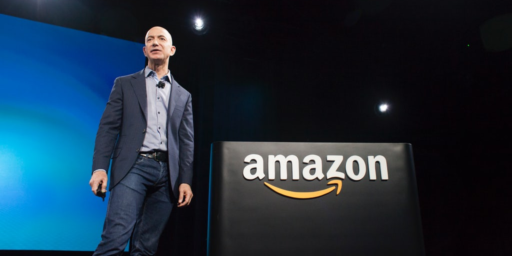Billionaires in Space
Magical? Impressive? Or just too much money?

CNN (“Virgin Galactic founder Richard Branson successfully rockets to outer space“):
Richard Branson became the first person to ride into space aboard a rocket he helped fund. The supersonic space plane developed by his company, Virgin Galactic, roared into the sky over New Mexico early Sunday, carrying Branson and three fellow crewmembers.
Branson —- along with Virgin Galactic employees Beth Moses, Colin Bennett, and Sirisha Bandla and pilots Dave Mackay and Michael Masucci — boarded the SpaceShipTwo, a winged plane with a single rocket motor that the company has spent nearly two decades developing, before the crack of dawn. Attached beneath its massive, twin-fuselaged mothership, dubbed WhiteKnightTwo, the vehicle took to the skies at 8:30 am MT and climbed to about 50,000 feet in the air.
Just after 9:15 in the morning, the SpaceShipTwo detached from its mothership and dropped momentarily before its engine screamed to life and the vehicle swooped upward. On board, the passengers experienced up to three Gs of force from the burst of extreme acceleration and watched the blue sky fade into the star-speckled darkness of outer space. At the top of the flight path, more than 50 miles high, the vehicle was suspended in weightlessness for a few minutes, allowing the passengers to enjoy panoramic views of the Earth and space as SpaceShipTwo flipped onto its belly. It then deployed its feathering system, which curls the plane’s wings upward, mimicking the shape of a badminton shuttlecock, to turn the spaceship rightward as it flew back into the Earth’s thick atmosphere and glided back down to a runway landing.
[…]
Branson’s flight — which came just nine days before Amazon bilionaire Jeff Bezos is slated to rocket into suborbital space aboard his own company’s spacecraft — is a landmark moment for the commercial space industry. The up-and-coming sector has for years been seeking to make suborbital space tourism (a relatively simple straight-up-and-down flight, as opposed to orbiting the Earth for longer periods) a viable business with the aim of allowing thousands of people to experience the adrenaline rush and sweeping views of our home planet that such flights can offer.
Branson and Bezos are situated to become direct competitors in that industry, each offering tickets to wealthy customers for brief rides to the upper atmosphere aboard supersonic, rocket-powered spacecraft.
Virgin Galactic plans to conduct just one more test flight before it will begin flying paying customers. More than 600 people have reserved tickets priced at $200,000 to $250,000 so far. The company is expected to reopen ticket sales soon, though at a higher price point.
NYT (“Branson Completes Virgin Galactic Flight, Aiming to Open Up Space Tourism“) adds:
Soaring more than 50 miles into the hot, glaringly bright skies above New Mexico, Richard Branson at last fulfilled a dream that took decades to realize: He can now call himself an astronaut.
[…]
More than an hour later, Mr. Branson took the stage to celebrate. “The whole thing was magical,” he said.
Later, during a news conference, Mr. Branson was still giddy, saying “I don’t know what’s going to come out of my mouth because I feel I’m still in space.”
Mr. Branson’s flight reinforces the hopes of space enthusiasts that routine travel to the final frontier may soon be available to private citizens, not just the professional astronauts of NASA and other space agencies. Another billionaire with his own rocket company — Jeff Bezos, the founder of Amazon — has plans to make a similar jaunt to the edge of space in nine days.
In each case, billionaire entrepreneurs are risking injury or death to fulfill their childhood aspirations — and advance the goal of making human spaceflight unexceptional.
“They’re putting their money where their mouth is, and they’re putting their body where their money is,” said Eric Anderson, chairman of Space Adventures Limited, a company that charters launches to orbit. “That’s impressive, frankly.”
My friend and co-blogger, Steven Taylor, is less impressed, commenting yesterday morning,
I also have to wonder, on a tangential matter, how Bezos spending what he is spending on a suborbital flight is a net good for society (and not a symbol of him having too much power in the form of wealth). Perhaps he ought to be paying his employees more (or paying higher taxes).
I am, perhaps not surprisingly, somewhere between those poles.
On the one hand, I didn’t watch the launch or care that much about it. A private individual replicating what Alan Shepard achieved 60 years and change earlier isn’t that exciting. Still, it’s at least interesting that those with a lot of money to spend will be able to fly into space just for the hell of it. And luxury goods typically go down-market pretty quickly.
On the other, I don’t know that the mere fact that Branson and Bezos are filthy, stinking rich is prima facie evidence that they’re underpaying their employees or shirking their responsibility as taxpayers. Offhand, Virgin seems like a pretty good company to work for and Amazon decidedly less so. I haven’t the foggiest how much Branson, a British citizen, pays in taxes. Bezos should almost certainly pay more—not so much because he has too much money but because we’re spending money way faster than we’re taking it in and somebody has to make up the deficit. (Unless Modern Monetary Theory is taken to its extreme; in which case taxes are simply unnecessary.)





Mostly, I agree with Rhett Butler, “Frankly, my dear, I don’t give a damn.”
OTOH, we’ve given these people ALL this money, and they have to spend it on something frivolous. I mean, what’s the return to them actually doing something that benefits human kind?
Although a not-so-small part of me wishes they’d emulate some of the Robber Barons of the 19th Century in returning their ill-gotten gains to society. I know, I know, there’s no unicorn in this stable.
Well, that’s a dubious distinction. But on the plus side, he’s making Elon Musk look good. Musk just sent his Tesla Roadster into space. And there was a purpose to it, as well (test flight ballast).
Something I found out yesterday that honestly pisses me off is that the “spaceport” in New Mexico from which this flight took off was built using $200 million in taxpayer money.
Branson could wipe his ass with $200 million and not remotely miss it, but he can’t pay for his own spaceport?
Socialize the cost (and the risk), privatize the profit–it’s the American way!
I guess the worth of this is tied to how important you think it is that private citizens fly around, not so much IN space, but at the EDGE of space. Is this going to make inter-continental flights faster? More economical? Will it mean I can get to New Zealand in a reasonable time frame?
It really strikes me as less Wright Brothers and more just a couple rich guys getting their jollies.
But I’d rather they do this than run for President and try to destroy Democracy.
On balance…harmless, but I wish someone would make them spend some of this money on taxes.
Of all the things billionaires could spend their money on, practical research on spaceflight technology seems remarkably fruitful.
Branson does not alarm me. He seems like not a jack-hole for being a billionaire. Musk OTOH is not a person I would ever trust on anything ever.
Dr. Steven Novella over at Neurologica, makes this point:
I’m sorry* to say I must put a Plato Paradox on him: he’s entirely right, but gets it completely wrong.
Space is already commercialized. All those GPS satellites, communication satellites, Earth resources satellites, weather satellites, internet satellites, etc. etc., are necessary to offer services at either affordable prices, or which would be impossible to provide otherwise, or which offer added value compared to older technologies.
These are all uncrewed, automated satellites mostly in low orbits (comsats are at a higher orbit, of around 30,000 kilometers above the surface). They’re expensive to build and launch, but a mere fraction of what it costs to launch people who need to take along water, food, and air with them.
What we don’t have yet is any places to go where we can make money. There are ample mineral resources, lying there useless and unexploited, in every planet, satellite, asteroid, and comet in the Solar System. To get to any of them, though, you need more fuel than to reach low Earth orbit, not to mention fuel to bring the ores back, and expensive re-entry systems. It would cost so much per kilogram of matter returned to Earth, that you probably wouldn’t break even if you mined either precious metals or diamonds, never mind lithium, rare earths, aluminum, or iron.
You could save some money if you could process the ores on site, and bring back only the refined, or near-refined, end product. But that would require launching tons of machinery, and very likely even more expensive people. Oh, and most refining methods in existence require things like acids, water, and energy. The last should be easy and cheap to get using solar panels. Water is in short supply off Earth, and not easily accessible.
Anyway, a few millionaires going off for 2 week jaunts to the ISS or some orbital hotel, or taking thrill rides to “the edge of space” won’t change this calculus.
At this time, our best concrete bet on a robust space infrastructure, is Elon Musk’s obsession with colonizing Mars. Largely because he’s the only one doing anything about it, as for instance developing the starship launch system.
*Because I like his blog, and his work on Skepticism and Evidence Based Medicine are very valuable.
@flat earth luddite: A quarter of a mill each for a carnival ride. Nice work if you can get it. It’s the same impulse that drives the guys we were looking at on Bring a Trailer who are bidding tens and hundreds of thousands of dollars to buy, in many cases, very ordinary used cars.
@de stijl: I’m very curious about these statements. Musk has done far, far more for the practical advance of spaceflight than Branson. The Falcon Heavy puts things into space for about 1/10 of the cost of other systems. He’s saving huge money for the government, and for commercial satellite operators.
I sort of get why you might not personally like the guy, since he’s obviously spectrum and doesn’t really filter himself in public. Whereas Branson is Mr. Charisma, for sure. But if you are asking who has advanced space exploration more, it isn’t close.
@Kathy: As the crawl on Luddites screen saver used to read:
@Jay L Gischer:
He has claimed this. We know for sure he has reused boosters on the Falcon 9*. He may be charging prices commensurate with his claims. But I still have my doubts whether or not he’s realizing the savings he claims.
No particular reason. I just haven’t seen a report on it that I can trust. And I think SpaceX is privately held, so keeping the relevant data hidden is feasible.
For all my enthusiasm about space, Musk’s larger contribution to humanity may wind up that he made electric cars cool.
*BTW, the Falcon Heavy, which is a Falcon 9 core with two Falcon 9 fist stage boosters, has been launched three times. Once on a test flight (with the famous red Tesla on it), the rest were commercial launches. Some more are scheduled.
@Jay L Gischer:
Musk routinely upsets world markets with “random” tweets. Usually about bit-coin.
Branson occasionally does first-claim tourist shit on Virgin Galactic flights. I would too if I paid for it.
Compare and contrast.
I understand Musk is Asperger’s or near enough on the spectrum. That does not explain away shitty behavior. That is not an excuse.
Not convinced billionaires developing missile technology is a good thing. If the North Koreans or the Iranians were doing this, we would be shitting our collective pants.
Not convinced Bezos, Musk and Branson are less dangerous.
Bezos is a good suit and a green tie away from being Lex Luthor.
@Kathy:
That’s mostly because SpaceX doesn’t really need the Falcon Heavy. They have the standard Falcon for most of the jobs, and they’re moving right on to Super Heavy/Starship.
Actually, space tourism and the stuff that you can do in zero-gee has been considered a way to commercialise space back from the 1980s when I was working in the field.
I’m a huge space buff, and considering we can’t even get people to be intelligent enough to get vaccinate themselves against a plague, I’m just as happy that we’ve got a bunch of billionaires shoving in this direction. I think it was Elon Musk who said that he was placing his bet on electric vehicles to help solve global warming–but if it didn’t work, he wanted a way to get off the planet.
If you haven’t had a chance to do so already, I highly recommend you watch the excellent documentary on Hulu called Summer of Soul. The documentary unearths video of the Harlem Cultural Festival – a series of soul music concerts in 1969. It is a beautiful, poignant film and a remarkable time capsule of an intersection of culture and society in a volatile era in the US.
But, on point, there is a segment about two thirds of the way through when the film covers the juxtaposition of this cultural festival and the Apollo moon landing that was happening concurrently. CBS sent reporters to ask festival attendees what they thought of this historic first and their response was telling – they didn’t see relevance for their lives at all. “Never mind the moon. Let’s get some of that cash in Harlem.”
Now, I’m a huge fan of NASA, I acknowledge all the scientific advancements from space exploration that have made their way into our daily lives, and I appreciate that it is not as simple of This or That when it comes to things the government pays for. But there’s a reason the government’s space agency isn’t funding experiments to advance suborbital space tourism. This is the filthy rich investing their wealth in order to seize the market of the merely dirty rich with the disposable income to shell out a quarter of a million dollars for “the adrenaline rush and sweeping views of our home planet.” The hubris of these billionaires, as well as the breathless coverage of their indulgences, lacks, well, soul.
I have no problem with the ultra-rich founders of these rocket companies taking a joy-ride on their rockets.
Publicity stunts like this raise attention & awareness about commercial launch vehicles (why do you think SpaceX sent Musk’s Roadster into space instead of a big chunk of rock or something?). I’d like to see Blue Origin and Virgin Galactic step up and become at least minimally competitive with SpaceX. That will drive innovation even more, and push where we can go with industry in space. And that will make it more likely that we’ll get off this rock and colonize.
But more practically: It will save tax dollars–dollars that can be used to pay down our outrageous debt, or put to better use than a jobs program for Boeing. The SLS has been in development for a decade, has cost tax-payers over $18B, and has progressed far enough to… do one successful static fire. When (if!) it ever actually launches, it will cost an estimated $2.5B per launch. A Falcon 9 launch is $62M for a new ship, $50M for a previously used one–2% of the cost of SLS.
I can think of a lot better ways to use the ~$20B that it will take to get to that first launch.*
If Branson, Bezos, and Musk can get us into space cheaply and safely, I have no problem with them spending their own money to take a joy ride–rather than taking our tax money to build a behemoth boondoggle.
===========
*NASA awarded less than $500M in investment to SpaceX during it’s early development. Subsequent funding–until the Moon mission award–has been contract for services. SLS is on a “Cost Plus” contract.
@Mu Yixiao:
Your wish is granted.
Except the competitors are Rocket Lab, and Boeing/Lockheed appearing as United Launch Alliance. Plus Virgin Orbit on the side.
Two launch small satellites, one is overpriced. I think that qualifies them all as minimally competitive 😉
And there are the state-owned/sponsored Russian, Chinese and European space agencies. And a few small actors, including India.
I am not against billionaires developing space technology and engineering as long as they share it.
I would prefer publicly funded NASA and ESA provided the blueprint.
I want a not-for-profit initial colony project to set the standard. Science, engineering, materials.
It will spin out of control with private companies competing thereafter. Can we control that?
As I said in today’s Forum, wake me up when one of these guys does an orbit. (Which Musk might.)
Otherwise, I’m with Dr. Taylor as quoted in the OP, these stunts are a compelling argument for a wealth tax and/or reinstating a 90% marginal income tax rate.
@Gustopher:
Dammit, I’m a-gonna steal this one.* Perfect!
*just as soon as I get the coffee off of my keyboard and monitor. Well played!
Meh…
Jeff Tracey has been doing it since the 60’s.
https://en.wikipedia.org/wiki/Thunderbirds_Are_Go
This is why I keep referring to “The edge of space.”
I’m not as good figuring out engineering issues, and the Virgin Galactic craft proved far more difficult to design, fly, and test than thought. But how hard is it to get them to climb another fifteen kilometers?
Ok, it’s about 17% higher, which looks more daunting. But if you intend to charge people a quarter million dollars for a joyride trip to space, shouldn’t you make sure there’s no question they’ve been in space?
@Kathy:
Edge of space has massive heat implications on re-entry. Is your heat shield able? Can you align properly? Is the structure able to withstand? Can you feather descent? Should you?
I told you about Kerbal Space Program. I used to be semi-educated.
This is the ultimate in ‘look-at-me’ vanity spending, and lucky us, Bezos and Musk are soon to follow. Frankly, we’re living in, and experiencing first hand, a Hyper Gilded Age.
According to Oxfam and others, the 8 richest people in the world have more combined wealth than do the poorest 4 billion people on this planet.
@de stijl:
Reentry issues have more to do with speed than altitude. An ICBM reaches speeds of several kilometers per second, for example, so it requires a heat shield on reentry.
The Branson space plane goes only to Mach 3, which is just above 1 kilometer per second. No reentry heat issues at such speeds. Look at the photos and video. there’s no heat shield at all.
I’m not so sure about Bezos’ capsule.
@gVOR08:
Just for the sake of argument, I’ll take the other side for at least a few of them (not Branson, though). Bezos built Amazon, and an IT organization that solved their problems, then realized he’d created large-scale cloud computing which is changing an enormous amount of stuff. Tesla changed how people look at electric cars. SpaceX is in the process of putting the SLA out of business. Alphabet (the parent company for Google ventures) is changing AI. Ask me in three years if Gates/Buffett have managed to change fission’s position in electrical power.
We don’t appear to have any alternative to a handful of tech billionaires to take the kinds of risks we ought to be taking.
@Kathy:
I think the thing is, while it might seem logical, sixty years into the Space Age, to start carving out interplanetary resources and colonies, earthly governments find the prospect terrifying. Supplying a handful of astronauts with food and energy and living facilities at a place so distant as the moon might cost ten times as much as operating the International Space Station (about 3 billion dollars per yeqr). A real settlement, with dependable nuclear power, self-sufficient in food, with necessary equipment for carving out roads and excavating living space would be more expensive yet. And the moon is going to be cheaper to settle than anywhere else in the solar system.
Not suprisingly, bragging ab0ut one’s capabilities in space exploration appeals to both conservative and liberal governments. Actually spending the money to make boasts into reality is something else. Not all one’s citizens find space exploration and settlement so attractive. And humungeous land grabs don’t look as attractive as they did in the 19th century anymore. Does that land grab look so imposing if soldiers are unavailable for defending it? And what does that cost? Also, the UN is filled with small nations that resent past colonization schemes by larger nations, and vote accordingly, which suggests additional costs.
It’s going to be a long long time — if ever — before the US government commits to building a lunar settlement. That means the burden for the task falls on Musk and Bezos and Branson and billionaires to come.
@mike shupp:
Well, yeah. They lost no time cancelling the Apollo program, and then slashing down NASA’s budget. In a way, it’s a wonder they got up to six actual Moon landings out of seven attempts (Apollo XIII did not land on the Moon).
As to the rest, there are no indigenous populations on the Moon or likely anywhere else in the Solar System. But other countries, even allies, would resent any country that claimed territories on the Moon, Mars, etc. for themselves.
The bottom line is there’s no profit as yet in colonizing the Moon, or other bodies. There may never be, until we begin to run out of the raw materials necessary to keep civilization going.
The biggest problem in space is that it’s expensive to put stuff in orbit. If these billionaires find some way to save money on that — as Musk has done in his way — we’ll all benefit. Space travel is one of those few places where a few billion can make a huge difference.
@Hal_10000:
Unsexy space elevator in Peru, Ecuador, Brazil maybe Kenya. Indonesia. Likely Peru.
Doable with near tomorrow engineering and tech. Equatorial bulge + mountain does a lot of the early work. The build up build down will be big dollars. Massive. What is bigger than Trillions? The next step up?
A boring space elevator makes all our hopes way easier.
It does not negate earth’s gravity well at all, but subverts it in a way sneakily.
What a colossal waist of money, a old wooden roller coaster would be more thrilling.
@de stijl:
All’s that’s needed for the Space Elevator is the invention of a material with a strength/weight ratio about 50x the highest currently known to exist. Material specifications is were a lot of great ideas go pear-shaped.
We stress and fret and whine about energy while living on a thin crust atop a ball of molten magma for roughly the same want.
@de stijl:
Clarke’s Fourth Law states any space elevator has to be built in Sri Lanka, even if it means moving it to the Equator 😉
@dazedandconfused:
There’s been talk of building it out of carbon nanotubes. Of course, that will take some doing, and many years of research.
PIIIIIIIIIGGGGSSSSS IIIIIINNNNNN SSSPPPPPAAAAACCCCCEEEEEE !!!!!